As night blanketed the cobblestoned streets of Old San Juan on Wednesday night, Carmen Viera and her family huddled on a street corner about a block away from the police blockade blocking entrance to the Governor’s Mansion – an area that’s been packed with protestors for about a week, at all hours, and plastered with posters and spray painted messages of resistance.
This night, however, the demonstration calling for Governor Rossello’s resignation was at a quantifiable peak. With an estimated 500,000 people present, protestors were spread throughout all of Old San Juan, filling its plazas with bomba y plena, chanting in unison throughout its streets, and wielding anti-Rosselló signs on virtually every corner.
“When have you seen a whole week of protests? This has never happened before,” Viera says. “El pueblo has reached its limit. When they messed with the muertos de María – that was the point of no return.”
“El pueblo has reached its limit. When they messed with the muertos de María – that was the point of no return.”
The leaked Telegram chats between Rossello and his closest allies were, for many Puerto Ricans, “la gota qué colmó la copa.” All the homophobia, transphobia, fat-shaming, misogyny, and even jokes about the deaths of Puerto Ricans in the post-Hurricane María crisis that were expressed within those 889 pages published by the Centro de Periodismo Investigativo were a tipping point – but they’re certainly not the only point.
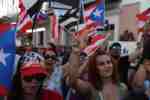
Only days earlier, former Secretary of Education Julia Keleher, Puerto Rico Health Insurance Administration head Ángela Ávila-Marrero, two businessmen, and two education contractors were arrested by the FBI, with a total of 32 counts of fraud and related charges between them. Investigations into their departments, as well as the Treasury Department and the Puerto Rico Electric Authority, are ongoing.
The chat also points to possible conspiracies and, at the very least, reveals strategy to manipulate public opinion. In the wake of the scandal, CFO Christian Sobrino (who in the chats joked about shooting San Juan Mayor Yulín-Cruz) and secretary of state Luis G. Rivera Marín have relinquished their posts.
Now the people want Rosselló out. And many say they won’t give up until he’s gone.

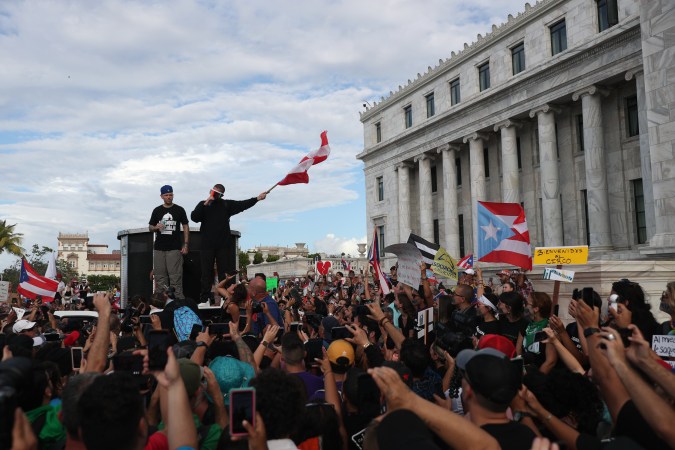
House of Representatives legislator Manuel Natal Albelo, who represents the newly formed political movement Victoria Ciudadana, believes that Rosselló will ultimately be removed – whether of his own accord or by impeachment. Behind the scenes, a new secretary of state (the position that succeeds governor) is being debated for appointment.
“It’s within the governor’s party, the Partido Nuevo Progresista, that this discussion is taking place,” Natal says, “Whereas it should be a discussion as public and transparent as what we’re doing in the streets.”
The successor, of course, would be the one to finish the term as governor until the 2020 election. Whoever it is, they won’t be a catalyst for change, Natal says. That will come by putting an end to the “corruption that has been consuming our island from the inside for many decades.”
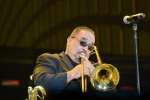
His exit is “not the magic wand that’s going to solve all of our problems,” Natal adds. “It’s a necessary step, but it’s not the final step.”
Rosselló’s exit is a necessary step, but it’s not the final step.
Protestors have expressed a commitment to a long-haul effort. A 30-year-old Old San Juan resident who works in community projects (as a government employee, she asked to remain anonymous) has been participating every day since Saturday, the first night of protests.
“We’ll be here until he resigns, and not only that, but until there is government reform,” she says.
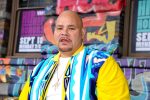
Police have pushed back nightly with tear gas, pepper spray, and rubber bullets. Arrests have been made, some by force. And, like at the many protests before this, images and video of “incubiertos,” or police agents disguised as protestors deliberately inciting violence, are circulating on social media. There is also footage of police allegedly setting off fireworks behind the barricades to spark chaos in the crowd.
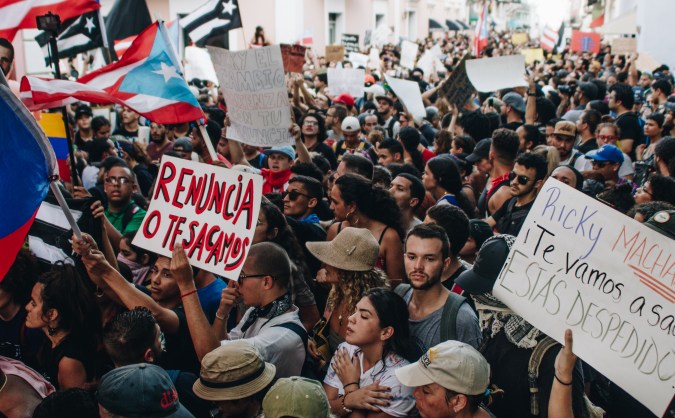
“We’re demonstrating before the state that we aren’t scared and we’re going to give it our all. This is super important,” she says. “Because what’s coming es fuerte.”
She’s concerned that prolonged protests might give the U.S. reason to intervene. Viera was similarly worried that, if Rosselló continues to resist, the situation could devolve into absolute anarchy.

Rosselló and police commissioner Henry Escalera are “directly responsible,” Natal says, for all that’s happened since protests began.
“The police have turned Old San Juan into a Call of Duty recreation, running around following protestors, throwing around gasses like it’s nothing, and compromising the health of many, including residents, and leaving a path of destruction,” Natal says. “I’m concerned that as things get more intense, from their end, the violence is going to escalate.”
Natal says some of the frontline force includes correctional officers, who are not well-trained in mass demonstrations.
“God forbid a tragedy happens,” Natal says. “If that happens, that blood will definitely be on the hands of Ricardo Rosselló and the police commissioner. That is simply not acceptable.”
Resistance movements in Puerto Rico have been growing markedly since the passage of PROMESA and the implementation of the U.S. Fiscal Oversight and Management Board, all purportedly to help the archipelago manage its bonds and pensions debt – now estimated at $120 billion. A round-the-clock encampment at the U.S. District Court in San Juan lasted for months in 2016. The following year, University of Puerto Rico’s Río Piedras campus students went on strike again – following its historic 2010 strike – and effectively shut down operations for months.

The May 1 National Strikes in 2017 and 2018 culminated in police violence in San Juan’s financial district. As further austerity measures were rolled out, teachers frequently protested Keleher and mass public school closures, and electrical industry unioners blocked access to the Capitol Building last fall in response to the proposed privatization of the public service. Unions marched in defense of pensions. Around the same time, la Colectiva Feminista en Construcción and its supporters camped out before the Governor’s Mansion for an entire weekend as they implored Governor Rosselló to declare a state of emergency after more than 41 women were killed in Puerto Rico in 2018. On the final day of protest, police pepper sprayed the crowd.
Participation at these events has always reflected a variety of ages, but in this archipelago-wide struggle to oust Governor Rosselló, crowds all over the island are especially diverse.
Genesis, 26, who’d just returned from vacation in L.A., was anxious to join the fight on Wednesday night.
“There’s a certain energy here,” she says. “The reality is that it’s going to be tedious, but we’ll keep going. It’s not just [the hippies’] fight: There’s abuelas, abuelos, kids, and all generations represented here.”
“There’s a certain energy here. The reality is that it’s going to be tedious, but we’ll keep going.”
Two young teens among the protestors – Tristan, 16, and Lukas, 14 – said it was their third day of protest in Old San Juan. Neither could remember exactly how many other protests they’d been to in recent years; they’ve participated in many.
There are demonstrations scheduled in and around Old San Juan through the next few days, including a reading of the Telegram chat transcript in its entirety at the Capitol Building on Saturday morning. Sunday in Mayagüez, protestors will convene in the evening at one of the schools closed under Keleher. A family-centric gathering is scheduled for the same day in San Juan at the Parque Luis Muñoz Rivera. Monday, the call is for a national strike: Protestors plan to occupy a major San Juan expressway.
Support worldwide is growing too, with the Puerto Rican diaspora protesting in various U.S. cities, and individuals and groups showing solidarity in Spain and throughout Europe.
What happens next isn’t for certain. Rosselló has publicly stated multiple times that he will not resign.
“This is a person who’s extremely stubborn,” Genesis says. “This person believes he’s entitled. This is something that we’ll have to fight not two days, not three days – it’s just starting.”
Meanwhile, Natal emphasizes that the time to plan for the future is now.
“We need to start talking about how to come together like we have so far, for the resignation of Ricardo Rosselló, but in this case, to put forward an alternative not only to Rosselló but to the corrupt two-party system that has exchanged power between different administrations for the last 80 years or so,” he says.
The question of who will run via Victoria Ciudadana’s platform is up to the people, Natal says. Right now, the group, which includes former 2016 gubernatorial candidates Alexandra Lúgaro and Rafael Bernabe, is focused on growing the movement. When the time comes, it will be the people who decide “where to concentrate our political capital,” rather than the group itself, Natal says. (The 33-year-old cannot run for governor himself because of minimum age requirements.)
“We need to start talking about a political alternative for the 2020 election,” Natal says. “We need to convert all the anger that we have right now into action that could actually change things, and that could actually represent taking back the government, and giving it to the people.”




